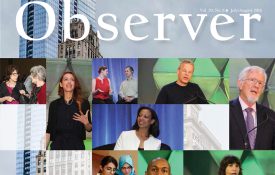-

How Rats, Bats, Bees, and People Navigate Their Worlds
Nearly 70 years ago, psychological scientist Edward Tolman introduced the idea that humans and other animals have a “cognitive map” that allows them to navigate their everyday spatial environments. Evidence of physical processes underpinning cognitive Visit Page
-
On One’s Own Time
People form a life story for themselves by weaving a temporal tapestry, taking psychological fabric from their past and threading it into their present experience and the future they hope to have. That’s essentially the Visit Page
-
Psychology and Technology: A Premium Blend
Whether they’re conducting industrial/organization studies or analyzing brain scans, psychological scientists are proving to be anything but Luddites. In “Advancing Psychological Science Through Technology,” a cross-cutting theme program at the 2016 APS Annual Convention in Visit Page
-
Learning With Amnesia
Actors are a group of people rife for research opportunities because their profession requires that they remember vast amounts of ever-changing information — and recite that information at a moment’s notice. In a recent study Visit Page
-

How Language ‘Framing’ Influences Decision-Making
The way information is presented, or “framed,” when people are confronted with a situation can influence decision-making. Visit Page
-
Steven Pinker: The Elephant, the Emperor, and the Matzo Ball
William James Fellow Award Address recorded May 2016 in Chicago at the 28th Annual Convention of the Association for Psychological Science. Visit Page

